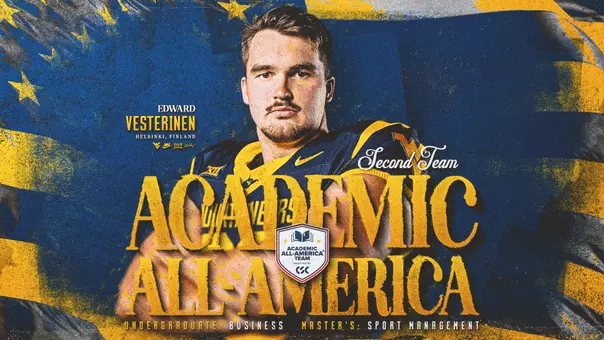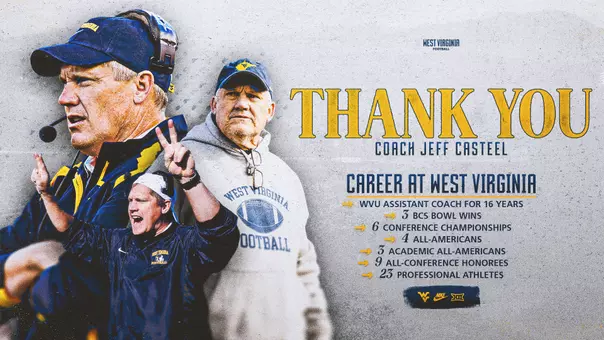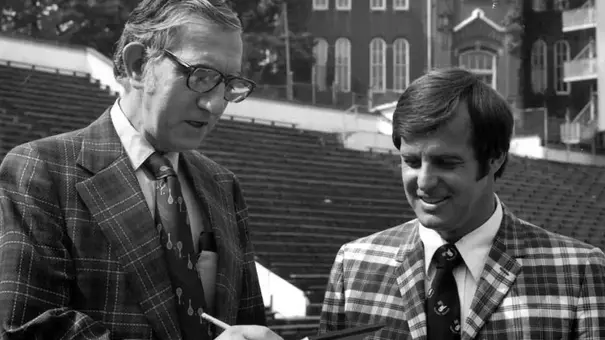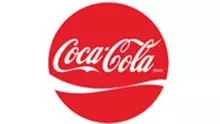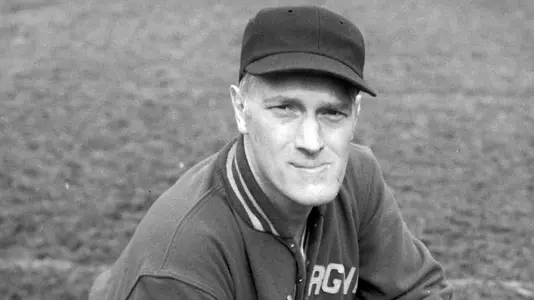
Photo by: WVU Athletic Communications
Athens, Ohio Was Dudley DeGroot’s Waterloo at WVU
July 24, 2025 10:06 AM | Football
MORGANTOWN, W.Va. – While looking at this year's football schedule poster and noticing the challenging road game at Ohio University looming on Saturday, Sept. 6, I couldn't help but think of Dudley Sargent DeGroot.
He was West Virginia's football coach the last time the Mountaineers visited Athens, Ohio, on Saturday, Sept. 24, 1949.
Despite being 20-point favorites, DeGroot's team lost to the Bobcats 17-7 in an error-filled game that included seven turnovers and some poor punting by Jimmy Walthall that kept Ohio U. constantly on WVU's side of the field.
The loss was totally unexpected, coming on the heels of West Virginia's season-opening 42-7 victory over Waynesburg and an outstanding 9-3 record the year prior that included a 21-12 Sun Bowl victory over Texas Western.
DeGroot was sort of a football savant, a Clark Shaughnessy protégé whose knowledge of the T offense helped him land head coaching jobs in professional football with the Washington Redskins and Los Angeles Dons.
His wide-ranging expertise expanded into the field of ornithology - specifically the study of bird eggs, which led some of his critics to begin referring to him as the "Birdman."
And DeGroot's critics in the Mountain State were aplenty.
The Stanford graduate quit his job with the Dons 11 games into the 1947 season after a three-game losing streak dropped the team's record to 5-6. Instead of returning with them to Los Angeles following a 16-13 loss at New York, he chose to remain on the East Coast and look for college jobs.
The jut-jawed DeGroot's coaching methods had rubbed some of the Dons players the wrong way, it was reported, which happened again during his brief two-year tenure at WVU.
Despite his hiring being promoted as unanimously approved by West Virginia's Athletic Council and Board of Governors, that was far from the case. There were some on the Council who preferred former Mountaineer star player Joe Stydahar, an all-pro tackle with the Chicago Bears who was working as an assistant coach for the Los Angeles Rams at the time.
Stydahar wanted the West Virginia job, but when he got word that Purdue president Fred Hovde's lofty praise of DeGroot had swayed enough members into DeGroot's camp, Jumbo Joe discreetly let his dissatisfaction be known to a handful of the state's sports editors.
Bill Hart, editor of Morgantown's Dominion-News, was one of those who eventually took up Stydahar's case. He wrote an editorial airing some of Joe's grievances with the selection process.
"Over and above all the 'present case in point' is something more important for we West Virginians to think about," Hart wrote. "If since 1867 we haven't produced graduates capable of making such success of their lives that they are worthy of being brought back to the university, just what is the university doing in an academic way anyway?
"That is the really disturbing thought because coaches come and go and so do presidents, but the university endures … Why then, are West Virginians with outstanding qualifications, eager to return to their alma mater, far too often denied that privilege of service?" he added.
Shortly afterward, Stydahar was hired to coach the Los Angeles Rams, leading them to a pro football championship in 1951, and his thorny relationship with some members of the Athletic Council no longer made him a viable candidate for future WVU football openings.
DeGroot, too, had aggressively pursued the West Virginia job and others, including Humboldt State in Arcata, California, when WVU president Irvin Stewart accepted the Athletic Council's recommendation to hire the California resident.
Consequently, DeGroot was already on shaky ground when he was officially announced as West Virginia's 25th head football coach on Jan. 31, 1948.
As an aside, DeGroot was counted as WVU football coach No. 24 at the time, but subsequent research discovered that Harold Jefferson Davall actually coached the 1901 season for the Mountaineers, not Louis Yeager.
At any rate, a good season in 1948 that included impressive home victories over South Carolina and Maryland with players DeGroot inherited from Bill Kern quieted some of his critics, but they returned with a vengeance after the Ohio U. loss.
The discord turned into an open rebellion by the end of the season when it mercifully concluded on Thanksgiving Day with a 47-7 loss at 15th-ranked Maryland.
By then, everything from DeGroot's tardiness purchasing a home in Morgantown, to the playing of his son Dudley DeGroot Jr., to certain aspects of his personal life became fair game to his critics.
WVU graduate Clem Hamilton, writing for Fairmont's The West Virginian, took DeGroot to task in one of his popular "Ham Gravy" columns. Hamilton wrote, in part, "… DeGroot has allowed his off-field actions to drop below the level he has led followers to expect …
"… My theory is that the football team this year was plagued by a bad case of disillusion – disillusion in its head coach …
"… He's harped on the short span of West Virginia coaches so much, that it is a 'coaches' graveyard,' that in the event that he should have the can tied on, thereby the blame will be on the university."
Hamilton's column irked the DeGroot family so much that Dudley Jr. sent a lengthy, well-written response that was published in full. During an open forum with some Mountaineer alums, DeGroot referenced Hamilton's column and his response to it raised even more eyebrows.
"There was no dissention on the team," he said. "It was merely the idle prattle of a young, marijuana-smoking sports editor in Fairmont."
In response to DeGroot's marijuana charge, Hamilton wrote, "Such name calling is not the mark of a Phi Beta Kappa key-bearing football coach."
There was the report of a fight between DeGroot and one of his assistant coaches during a practice resulting in DeGroot receiving a black eye, which led to the permanent banning of the press from observing further football practices that season. That basically meant local sportswriter Tony Constantine, who was the only person interested in watching practices anyway.
Two weeks after the Maryland loss, Charleston Gazette sports editor A.L. "Shorty" Hardman took his turn analyzing West Virginia's Dudley DeGroot conundrum in a column published on Sunday, Dec. 11, 1949.
"It has been obvious for some time that DeGroot and West Virginia football followers have not been seeing eye-to-eye," he wrote. "The prime reason for this is that the good doctor, one of the nation's foremost teachers of football, has been slurred in the public press by 'master minds' who have tried to play quarterback for WVU since the days of Harry Adams Stansbury (WVU's first athletic director)."
DeGroot, who was publicly supported by Beckley sports editor George Springer, made some off-the-cuff remarks late in the season that ruffled even more feathers. DeGroot, his guard down, was letting off some steam while talking to a group in Beckley that included Springer.
"Education goes on," he said. "A person must coach professional football and then come to West Virginia to get a real education. In all my years of coaching I have never known so many wise guys who know all the answers as I have met in West Virginia."
A little more than a month after the season's conclusion, DeGroot took the New Mexico head coaching job for $4,000 less than he was making at West Virginia.
According to Hardman, the beginning of the end for the embattled coach at West Virginia University came in Athens, Ohio, one sunny Saturday September afternoon in 1949.
"A defeat by Ohio University, entirely unexpected, lowered the Mountaineer damper early in the season and West Virginians, unaccustomed to coming up off the floor to fight back, started to single out individuals on which to place the blame," he wrote.
"DeGroot stunned his most severe critics by assuming the blame himself," Hardman added. "But so much fun was poked at the 'mighty' Mountaineers and so many people jumped off the bandwagon that it developed later that this surprising setback was to spoil the entire season."
DeGroot, well-aware of West Virginia's "coaching graveyard" reputation at the time, made mention of it occasionally when discussing his brief two-year tenure in Morgantown.
Hardman took a balanced approach in his analysis of the situation.
"Indeed, if DeGroot has been unhappy in West Virginia, it is because he has not had the consideration due a coach," he wrote. "Regardless of the feeling of some, there are two sides to the question and as coach of the team, the doctor was entitled to a certain amount of respect and support that he most certainly has not received."
Hardman later added, "The fact that Dud is a good football coach and nationally known cannot be laughed off. So, it follows that if a man of his proven ability cannot get along in West Virginia and do the football coach as it should be done, WHO WOULD tackle the job?"
History tells us it was to be Ohio University graduate Art "Pappy" Lewis, as irony would have it!
Isn't it funny how a simple football poster can stir the minds of the historically inclined?
He was West Virginia's football coach the last time the Mountaineers visited Athens, Ohio, on Saturday, Sept. 24, 1949.
Despite being 20-point favorites, DeGroot's team lost to the Bobcats 17-7 in an error-filled game that included seven turnovers and some poor punting by Jimmy Walthall that kept Ohio U. constantly on WVU's side of the field.
The loss was totally unexpected, coming on the heels of West Virginia's season-opening 42-7 victory over Waynesburg and an outstanding 9-3 record the year prior that included a 21-12 Sun Bowl victory over Texas Western.
DeGroot was sort of a football savant, a Clark Shaughnessy protégé whose knowledge of the T offense helped him land head coaching jobs in professional football with the Washington Redskins and Los Angeles Dons.
His wide-ranging expertise expanded into the field of ornithology - specifically the study of bird eggs, which led some of his critics to begin referring to him as the "Birdman."
And DeGroot's critics in the Mountain State were aplenty.
The Stanford graduate quit his job with the Dons 11 games into the 1947 season after a three-game losing streak dropped the team's record to 5-6. Instead of returning with them to Los Angeles following a 16-13 loss at New York, he chose to remain on the East Coast and look for college jobs.
The jut-jawed DeGroot's coaching methods had rubbed some of the Dons players the wrong way, it was reported, which happened again during his brief two-year tenure at WVU.
Despite his hiring being promoted as unanimously approved by West Virginia's Athletic Council and Board of Governors, that was far from the case. There were some on the Council who preferred former Mountaineer star player Joe Stydahar, an all-pro tackle with the Chicago Bears who was working as an assistant coach for the Los Angeles Rams at the time.
Stydahar wanted the West Virginia job, but when he got word that Purdue president Fred Hovde's lofty praise of DeGroot had swayed enough members into DeGroot's camp, Jumbo Joe discreetly let his dissatisfaction be known to a handful of the state's sports editors.
Bill Hart, editor of Morgantown's Dominion-News, was one of those who eventually took up Stydahar's case. He wrote an editorial airing some of Joe's grievances with the selection process.
"Over and above all the 'present case in point' is something more important for we West Virginians to think about," Hart wrote. "If since 1867 we haven't produced graduates capable of making such success of their lives that they are worthy of being brought back to the university, just what is the university doing in an academic way anyway?
"That is the really disturbing thought because coaches come and go and so do presidents, but the university endures … Why then, are West Virginians with outstanding qualifications, eager to return to their alma mater, far too often denied that privilege of service?" he added.
Shortly afterward, Stydahar was hired to coach the Los Angeles Rams, leading them to a pro football championship in 1951, and his thorny relationship with some members of the Athletic Council no longer made him a viable candidate for future WVU football openings.
DeGroot, too, had aggressively pursued the West Virginia job and others, including Humboldt State in Arcata, California, when WVU president Irvin Stewart accepted the Athletic Council's recommendation to hire the California resident.
Consequently, DeGroot was already on shaky ground when he was officially announced as West Virginia's 25th head football coach on Jan. 31, 1948.
As an aside, DeGroot was counted as WVU football coach No. 24 at the time, but subsequent research discovered that Harold Jefferson Davall actually coached the 1901 season for the Mountaineers, not Louis Yeager.
At any rate, a good season in 1948 that included impressive home victories over South Carolina and Maryland with players DeGroot inherited from Bill Kern quieted some of his critics, but they returned with a vengeance after the Ohio U. loss.
The discord turned into an open rebellion by the end of the season when it mercifully concluded on Thanksgiving Day with a 47-7 loss at 15th-ranked Maryland.
By then, everything from DeGroot's tardiness purchasing a home in Morgantown, to the playing of his son Dudley DeGroot Jr., to certain aspects of his personal life became fair game to his critics.
WVU graduate Clem Hamilton, writing for Fairmont's The West Virginian, took DeGroot to task in one of his popular "Ham Gravy" columns. Hamilton wrote, in part, "… DeGroot has allowed his off-field actions to drop below the level he has led followers to expect …
"… My theory is that the football team this year was plagued by a bad case of disillusion – disillusion in its head coach …
"… He's harped on the short span of West Virginia coaches so much, that it is a 'coaches' graveyard,' that in the event that he should have the can tied on, thereby the blame will be on the university."
Hamilton's column irked the DeGroot family so much that Dudley Jr. sent a lengthy, well-written response that was published in full. During an open forum with some Mountaineer alums, DeGroot referenced Hamilton's column and his response to it raised even more eyebrows.
"There was no dissention on the team," he said. "It was merely the idle prattle of a young, marijuana-smoking sports editor in Fairmont."
In response to DeGroot's marijuana charge, Hamilton wrote, "Such name calling is not the mark of a Phi Beta Kappa key-bearing football coach."
There was the report of a fight between DeGroot and one of his assistant coaches during a practice resulting in DeGroot receiving a black eye, which led to the permanent banning of the press from observing further football practices that season. That basically meant local sportswriter Tony Constantine, who was the only person interested in watching practices anyway.
Two weeks after the Maryland loss, Charleston Gazette sports editor A.L. "Shorty" Hardman took his turn analyzing West Virginia's Dudley DeGroot conundrum in a column published on Sunday, Dec. 11, 1949.
"It has been obvious for some time that DeGroot and West Virginia football followers have not been seeing eye-to-eye," he wrote. "The prime reason for this is that the good doctor, one of the nation's foremost teachers of football, has been slurred in the public press by 'master minds' who have tried to play quarterback for WVU since the days of Harry Adams Stansbury (WVU's first athletic director)."
DeGroot, who was publicly supported by Beckley sports editor George Springer, made some off-the-cuff remarks late in the season that ruffled even more feathers. DeGroot, his guard down, was letting off some steam while talking to a group in Beckley that included Springer.
"Education goes on," he said. "A person must coach professional football and then come to West Virginia to get a real education. In all my years of coaching I have never known so many wise guys who know all the answers as I have met in West Virginia."
A little more than a month after the season's conclusion, DeGroot took the New Mexico head coaching job for $4,000 less than he was making at West Virginia.
According to Hardman, the beginning of the end for the embattled coach at West Virginia University came in Athens, Ohio, one sunny Saturday September afternoon in 1949.
"A defeat by Ohio University, entirely unexpected, lowered the Mountaineer damper early in the season and West Virginians, unaccustomed to coming up off the floor to fight back, started to single out individuals on which to place the blame," he wrote.
"DeGroot stunned his most severe critics by assuming the blame himself," Hardman added. "But so much fun was poked at the 'mighty' Mountaineers and so many people jumped off the bandwagon that it developed later that this surprising setback was to spoil the entire season."
DeGroot, well-aware of West Virginia's "coaching graveyard" reputation at the time, made mention of it occasionally when discussing his brief two-year tenure in Morgantown.
Hardman took a balanced approach in his analysis of the situation.
"Indeed, if DeGroot has been unhappy in West Virginia, it is because he has not had the consideration due a coach," he wrote. "Regardless of the feeling of some, there are two sides to the question and as coach of the team, the doctor was entitled to a certain amount of respect and support that he most certainly has not received."
Hardman later added, "The fact that Dud is a good football coach and nationally known cannot be laughed off. So, it follows that if a man of his proven ability cannot get along in West Virginia and do the football coach as it should be done, WHO WOULD tackle the job?"
History tells us it was to be Ohio University graduate Art "Pappy" Lewis, as irony would have it!
Isn't it funny how a simple football poster can stir the minds of the historically inclined?
Rich Rodriguez | Dec. 3
Wednesday, December 03
Reid Carrico | Nov. 29
Saturday, November 29
Jeff Weimer | Nov. 29
Saturday, November 29
Rich Rodriguez | Nov. 29
Saturday, November 29
